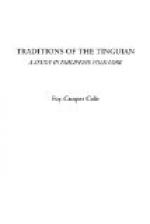Not long after they finished and Aponibolinayen washed, and when she had finished washing she put away those things which they ate and Ini-init made trouble because of the stick which became a fish. He again asked Aponibolinayen how she made the stick into fish, and Aponibolinayen said, “Do not trouble yourself, perhaps you know about the rich woman who practices magic in Kaodanan,” and Ini-init said, “Yes, I know the rich woman who practices magic in Kaodanan, who sometimes has much power, who changes, who has no equal.” Aponibolinayen said, “Why do you still ask if you know?” “I ask because I want to be sure, even though I know you have much power,” said Ini-init. “If that is true, do not ask again,” she said. Not long after while they were talking, they went to sleep, and when it began to be early morning Ini-init went to make the sun on all the world; when they had finished to eat he went to shine. Aponibolinayen staid in the house. When it came afternoon, the sun went down and he went directly to fish in the river, for the fish which they ate—the two who were married. Not long after he caught again a big fish, and he went home. When he arrived, Aponibolinayen had finished cooking, and he asked where she got the fish which she had cooked, and she said, “Why do you ask again? You know it is the stick which I cook, which is fish, which we ate, before you arrived again with fish. Throw away the fish which you caught, for this stick is many fish which I cook.” After that Ini-init said, “Why do you order to throw away, that which serves the purpose to which we put it, even though you cook many sticks?” “If you value it, hang it on the hanger, and you come and eat.”
Not long after they ate, and when they had finished eating, they washed, and when they had finished washing those things which they used to eat on, they talked and they went to sleep.
When it became the middle of the night, Aponibolinayen woke up. “I go up with you when you go up in the early morning,” she said. Ini-init said to her, “Do not come, for it is very hot up above. You cannot endure the heat, and you will repent when we are there.” “No, if it is too hot, we shall take many blankets and pillows, which I shall go under,” she said again and again until it became early morning, then Ini-init agreed. They ate first and then they arranged those pillows and blankets which they took with them.
Not long after they went east, and when they arrived there the sun shone, and Aponibolinayen became oil because it was so hot, and Ini-init put her in a bottle, and he corked it and covered it with blankets and pillows, which sheltered her, and he dropped it down. She fell by the well in Kaodanan, and Indiapan, who was still dipping water, turned her face at the sound of the falling at her side. She saw many good blankets and pillows, and she unwrapped that which was wrapped, and when she had finished to unwrap she saw it was a pretty lady—none equal to




